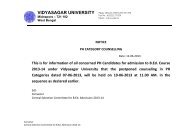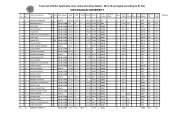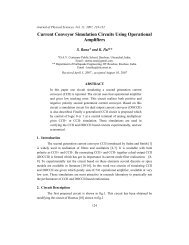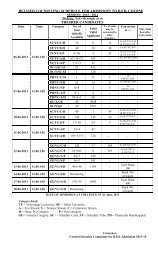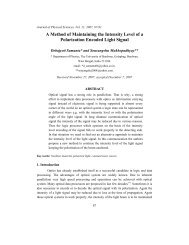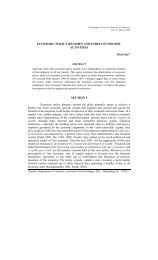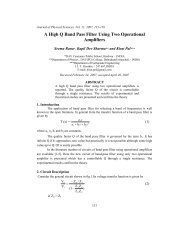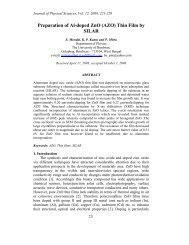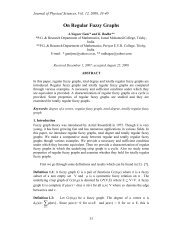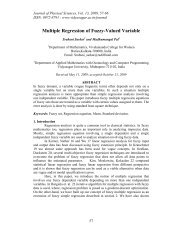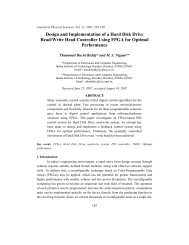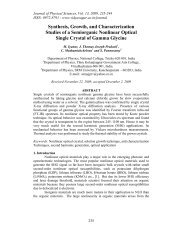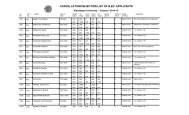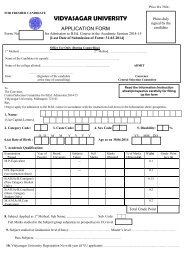VIDYASAGAR UNIVERSITY JOURNAL OF COMMERCE
VIDYASAGAR UNIVERSITY JOURNAL OF COMMERCE
VIDYASAGAR UNIVERSITY JOURNAL OF COMMERCE
Create successful ePaper yourself
Turn your PDF publications into a flip-book with our unique Google optimized e-Paper software.
A SURVEY ON THE RECAPITALISATION, MERGERS AND ACQUISITIONS <strong>OF</strong> THE NIGERIAN INSURANCE INDUSTRY<br />
Table 13 shows that 50.00% of the respondents agreed that mergers and acquisitions were<br />
good sources of large capital base, 38.39% strongly agreed, 5.56% were indifferent but<br />
3.70% disagreed and 1.85% strongly disagreed. From table 14, 33.33% of the respondents<br />
disagreed that mergers and acquisitions posed a greater threat to the unity of operation of the<br />
constituent companies, 29.63% were indifferent, 20.37% strongly disagreed but 14.80%<br />
agreed while 1.85% strongly agreed. Table 15 shows that 40.74% of the respondents<br />
strongly disagreed that it was better for some insurance companies to close operations than<br />
getting involved in mergers and acquisitions, 27.78% disagreed, 16.67% were indifferent but<br />
11.11% agreed while 3.70% strongly agreed. Table 16 shows that 25.93% of the respondents<br />
were indifferent on raising capital through the Stock Exchange and public offer is better than<br />
mergers and acquisitions, 25.93% strongly disagreed, 24.07% disagreed but 20.37% agreed<br />
while 3.70% strongly agreed. Table 17 revealed that 40.74% of the respondents agreed that<br />
there was a problem of merging the various units of the companies involved in mergers and<br />
acquisitions, 22.22% disagreed, 18.52% were indifferent but 16.67% strongly disagreed<br />
while 1.85% strongly agreed. Table 18 shows that 48.15% of the respondents agreed that by<br />
merging with and acquiring other insurance companies, the underwriting performance will<br />
improve, 25.93% strongly agreed, 12.96% were indifferent but 9.26% disagreed while<br />
3.70% strongly disagreed. From table 19, it could be seen that 35.19% of the respondents<br />
disagreed that the premium income generated by insurance companies justified the recent<br />
recapitalization exercise, 29.63% strongly disagreed, 22.22% agreed but 9.26% were<br />
indifferent while 3.70% strongly agreed.<br />
Table 20 shows that 51.850% of the respondents agreed that insurance companies can meet<br />
up with the recapitalization requirement without any sharp practices, 18.52% strongly<br />
agreed, 12.96% were indifferent but 11.11% strongly disagreed while 5.56% disagreed.<br />
From the table 21, it could be seen that 33.33% of the respondents agreed that the last<br />
recapitalization exercise is too close to the recent recapitalization exercise, 20.07%<br />
disagreed, 16.67% strongly disagreed but 14.82% were indifferent while 11.11% strongly<br />
agreed. Table 22 shows that 35.19% of the respondents disagreed that differences in work<br />
practices by the insurance companies would have negative effect, 25.93% strongly<br />
disagreed, 20.37% were indifferent but 16.67% agreed while 1.85% strongly agreed. From<br />
table 23, it could be seen that 35.19% of the respondents disagreed that the insurance<br />
industry is not ripe for a new round of recapitalization, 25.93% strongly disagreed, 20.37%<br />
were indifferent but 16.67% agreed while 1.85% strongly agreed. Table 24 shows that<br />
37.04% of the respondents agreed that there was a positive relationship between the level of<br />
capitalization and the level of development in the insurance industry, 33.33% strongly<br />
agreed, 12.96% strongly disagreed but 9.26% were indifferent while 7.41% disagreed.<br />
42<br />
Vidyasagar University Journal of Commerce



